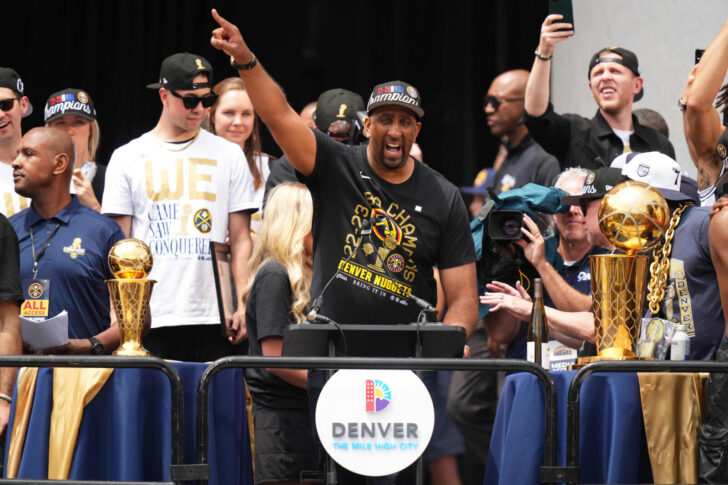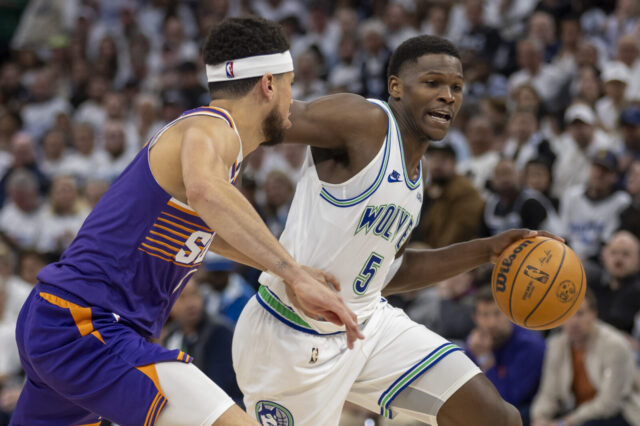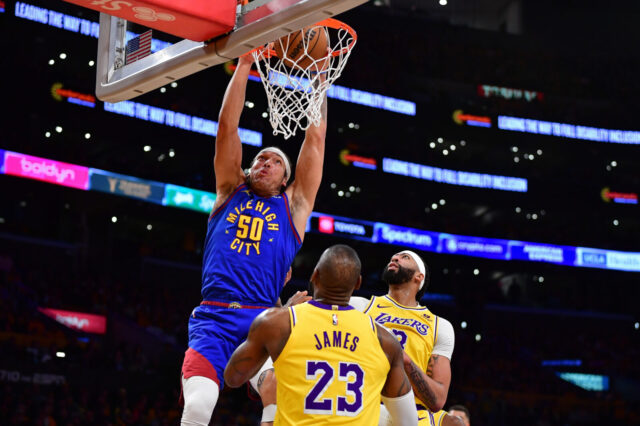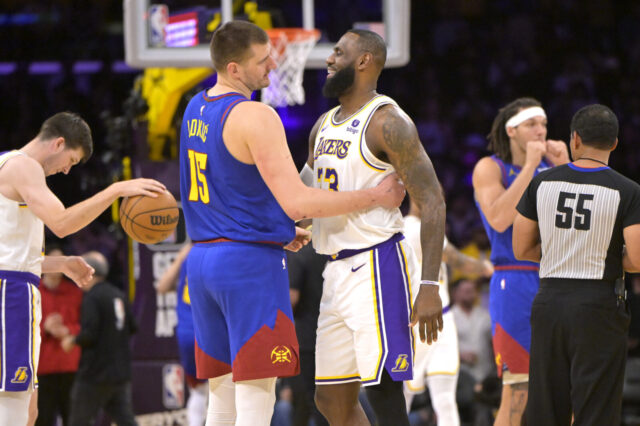It’s now Monday, February 5th. Roughly 72 hours before the trade deadline.
The Denver Nuggets, reigning NBA champions, currently possess a 35-16 record and are effectively tied with three other teams for the top seed in the Western Conference. The Oklahoma City Thunder, Minnesota Timberwolves, and Los Angeles Clippers are all rolling right along, dominating the regular season competition. The Nuggets were expected to be at the top of the West, but very few people expected the Thunder, Timberwolves, and Clippers to be jockeying for the top seed, let alone all of them at once.
As a result, the playoff landscape in the Western Conference has shifted dramatically. Teams that the Nuggets may have assumed they were game-planning for in a playoff series – The Phoenix Suns, Los Angeles Lakers, Golden State Warriors, and Memphis Grizzlies – are further down the standings. Two or more of those teams are likely to miss the playoffs too, meaning that Denver will have to prepare to face other teams in the playoffs instead.
So, what changes? Well, not a ton. The Nuggets know their starting five. That isn’t changing ahead of the trade deadline, and it’s an incredible unit. According to Cleaning the Glass, the Nuggets five-man unit of Jamal Murray, Kentavious Caldwell-Pope, Michael Porter Jr., Aaron Gordon, and Nikola Jokic is winning its minutes by 13.0 points per 100 possessions. Last year, that group won minutes by 12.7 points per 100, and the added year of chemistry and cohesion appears to have helped. When the going gets tough, the Nuggets will up the minutes for their starting group, and each of those guys will play at least 35 minutes when the times comes.
Like last season though, the problems begin when Denver dives into the bench minutes, specifically when Jokic isn’t on the floor. The Nuggets win Jokic’s minutes by 10.7 points per 100 possessions when he’s out there. When he’s not, Denver loses the minutes by 10.3 points per 100 possessions. Like with the starting lineup, Jokic will play more when the playoffs arrive. Since the 2018-19 season, Denver’s first playoff year, Jokic’s minutes per game has increased from 33.1 minutes in the regular season to 37.6 minutes in the playoffs. Realistically, the Nuggets need to be able to survive in those other configurations. They don’t need to thrive.
So, how do the Nuggets improve their bench?
Let’s begin with resources. The Nuggets do not have a ton of trade-able contracts. Outside of their starting five, the three largest per year salaries on Denver’s roster belong to Reggie Jackson ($5 million), Zeke Nnaji ($4.3 million), and Christian Braun ($2.9 million). That’s not a lot of money to throw around, and two of the three guys are expected to play an integral role in Denver’s bench rotation.
The Nuggets are looking for a cheap salary to match, and they’re also looking for a reasonably priced veteran on the draft picks front, because the Nuggets have very little draft capital to throw around. The Nuggets do not have a first round pick available to trade due to previous trades made with the Orlando Magic (2025 first round pick), Oklahoma City Thunder (2027 first round pick), and Indiana Pacers (2029 first round pick rerouted to OKC anyway). The Nuggets do have second round picks available to trade in 2024, 2026, 2028, 2029, and 2030, and they could always attach first round pick swaps for extra incentive.
But it’s truly a bereft war chest of trade assets in Denver unless they decide to part with one of Peyton Watson, Christian Braun, or Julian Strawther. Attaching one of those three would get the attention of other teams, but Denver again runs into the issue that those young players (namely Watson and Braun) are already helping the team.
On the season, the Nuggets five starters are each averaging at least 31 minutes per game, while there are only three bench guys exceeding 15 minutes per game: Reggie Jackson (23.1 minutes per game), Christian Braun (18.8), and Peyton Watson (18.1). Jackson started 14 games in place of an injured Jamal Murray earlier in the season though, and in the games when Jackson is coming off the bench, he averages closer to 20 minutes per game.
So in a playoff series, if each of the starters averages 35 minutes per game, while Jackson averages 20 minutes and both Braun and Watson average 18, that total adds up to 231 total minutes per game. In a playoff rotation, you need 240 to survive. Yes, some of those totals could change, and it’s possible that both Jokic and Murray play 40 minutes a night in the games they need most, but it’s always nice to have options.
Last year, the Nuggets utilized Bruce Brown for heavy minutes, Jeff Green as the seventh man, and had Christian Braun fill in the gaps on the wings. They also had DeAndre Jordan provide spot minutes at backup center, though he only played in four of the 20 games. Brown averaged 26.5 regular minutes, Green 17.2, and Braun 13.0.
That ultimately proved good enough, and it appears the Nuggets are likely on a similar trajectory with Jackson, Braun, and Watson. Now, which of those bench guys plays which spot is up for debate, but with Watson emerging as a steady option (20.2 minutes in the last 34 games) it’s possible that Denver’s wing/forward minutes are less concerning than the guard/big man minutes.
At this time last season, the Nuggets ultimately acquired veteran center Thomas Bryant at the trade deadline using three second round picks. They also added Jackson via the buyout market. Neither of those options ultimately helped Denver in the midst of the playoff run, but they could have, especially in the event of an injury. Ultimately, neither offensive guard nor offensive big man played in a playoff series, and the Nuggets will likely take that into account as they think about playoff lineups and rotations.
This could be where Denver’s mentality changes year-over-year though, because last year’s team was primarily focused on if they could get enough stops to win a championship. Denver had an elite offense and subpar defense in the regular season, so they simply played their best defensive guys in the playoffs to make up the difference. In the playoffs, the Nuggets played the seventh, eighth, ninth, and 13th ranked regular season defenses, and they felt comfortable scoring on those teams whenever they needed to.
This year, the Nuggets currently have the ninth ranked offense and 12th ranked defense. They’re more balanced, but they also appear a bit more liable to offensive shortcomings, even with Jokic on the floor, than they were last year. It doesn’t help that the competition appears more stout defensively: the Timberwolves are the best defense in the NBA. The Thunder rank fourth. The Clippers rank eighth (on top of having the best offense in the league now). It’s possible the Nuggets will be challenged far more on the offensive end as a result, and they could choose to account for that at the deadline.
So, what can the Nuggets add that helps them? Where can they upgrade?
Late last week, Marc Stein reported that the Nuggets are interested in backcourt reinforcements and inquired about Washington Wizards guard Delon Wright. Wright is a player the Nuggets have had interest in previously and have kept tabs on him. He’s a smart player on both ends and has maintained a 3.5% steal rate this season. Among all guards with at least 10,000 career minutes, Wright’s 2.9% steal rate ranks 29th all-time. He’d be a helpful defensive player and wouldn’t make a ton of mistakes offensively, something that the Nuggets last year would have been all over.
However, Reggie Jackson would most likely be the matching salary here (along with likely Vlatko Čančar and second round picks). The Nuggets would be trading offense for defense in this scenario, and while it’s likely that Murray, Porter, Gordon, and Caldwell-Pope would all have some hand in bolstering the non-Jokic minutes with the bench unit, removing Jackson from the equation removes a level of scoring punch the Nuggets might need in a playoff series.
Every trade Denver could make has some give and take, and the Nuggets will have to weight risk vs reward very heavily.
Alex Caruso would appear to be the best of both worlds from Denver’s perspective, as he’s shooting above 40% from three and remains one of the premier point-of-attack defenders in the league. Unfortunately, he’s outside of Denver’s price range unless they’re willing to part with young players, and it doesn’t appear the Nuggets are willing to go that route.
The Nuggets could use a bench shooter, somebody that comes off the bench and is a threat to hit threes with efficiency, spaces the floor, and draws attention away from star players. Somebody like Sam Hauser on the Boston Celtics comes to mind, who’s averaging 5.4 three-point attempts per game and shooting 41.6% from deep. The Nuggets have two bench wings, Justin Holiday and Julian Strawther that might be able to fill that role, but Holiday’s a lot more judicious with his shot selection (7.2 threes attempted per 100 possessions compared to Hauser’s 12.3) while Strawther’s only shooting 32.2% from three and has been out since January 4th.
Unfortunately, there are very shooters available of that ilk. Alec Burks is the only player that really fits that mold, but his salary is difficult for Denver to match, and the trade market for Burks is likely to keep him out of their price range.
Denver could always seek out a forward instead, looking to replicate the minutes they got with Jeff Green. With Aaron Gordon once again likely to reprise his role as Denver’s playoff backup center, having another forward capable of switching and guarding bigger guys would be useful. Yes, the Nuggets still have Watson, but part of his utility is guarding lead ball handlers at the point of attack and on the wing, and playing him as the backup small forward could open up backup power forward minutes. Players like Dorian Finney-Smith or Royce O’Neale from the Brooklyn Nets appear to be available, but the contracts are difficult to match unless Denver trades Jackson. Perhaps a reunion with old friend Danilo Gallinari could make some sense for the Nuggets as a bench forward who could space the floor? Gallinari is a career 38.2% three-point shooter and is owed $6.8 million this year, a far more matchable contract. Maybe Doug McDermott on the buyout market could satisfy some of those needs.
Finally, a big man could always be had for Denver, if only to help get them through the regular season and reduce Jokic’s and Gordon’s minutes load during the final 31 games of the regular season. The big man market is always complex, but a younger player like Xavier Tillman (an unrestricted free agent in 2024) could make sense on a cheaper salary. What about Miami Heat big man Kevin Love, who would be an interesting addition to replicate Jokic’s skill set as a dribble hand-off threat? Andre Drummond is more of a regular season option, but his rebounding and passing are two helpful skills the Nuggets could build a bench lineup around. Kelly Olynyk, Clint Capela, and Daniel Gafford are all nice in theory, but the contract numbers make it difficult to build a deal due to the poison pill on Zeke Nnaji’s contract.
(On an aside, many of Denver’s big man issues would be irrelevant if Nnaji played at the level many in the front office and coaching staff expected to play, but Nnaji has become unplayable in Denver’s rotation. The Nuggets have lost the plus-minus battle in Nnaji’s minutes in 27 of the 37 games he’s played so far, and four of the times they didn’t were purely garbage time minutes. It will be interesting to see if Nnaji ever gets another chance in Denver’s rotation, because he’s under contract in Denver for another three seasons, plus a player option in 2027-28. The best case scenario is Nnaji simply playing better, but the minutes have been so bad that Denver can’t afford to trust them in a playoff run.)
Michael Malone shared this statement to close last night’s presser about the approaching trade deadline:
“Calvin and his staff I’m sure are fielding phone calls, but I can’t imagine we’re actively calling many teams right now.”
“I think you always have to be responsible enough and say ‘Can we do anything that makes us better?’ That’s always a question you have to ask, but knowing Calvin and the brief conversations we’ve had, there’s nothing where Calvin’s on the phone, burning up the phone lines to 29 other teams because we think that we have a tremendous starting unit, and we’ve got some guys on the bench that are young and developing and have a chance to be really good players for years to come.”
Malone continued: “I love the group in that locker room. I love where we’re at, and more importantly, I think we have another level that we can get to.”
That doesn’t sound like a coach that’s itching to make changes or sees too many holes in the roster, so I wouldn’t expect too much noise around the Nuggets come trade deadline time.
But you never know what phone call you could get. You never know what kind of offer presents itself. The Nuggets will do their due diligence, and if the right deal comes along, Calvin Booth will not hesitate to get it done.



